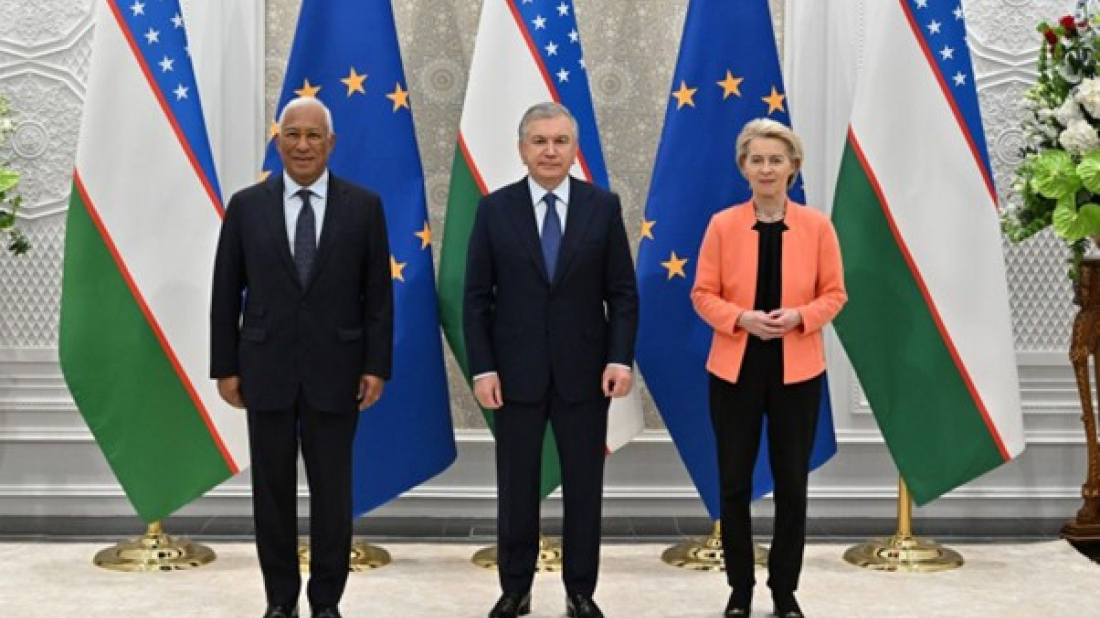UK allows U.S. use of British bases for Iran defence strikes
The UK has allowed the U.S. to use its bases for defensive strikes against Iran amid escalating mis...

Leaders from Central Asia and the European Union will meet in Samarkand on April 4 for the first-ever EU-Central Asia Summit, aimed at deepening ties. Talks will focus on trade, investment, green energy, and security — marking a new era of cooperation.
European Commission President Ursula von der Leyen arrived in Samarkand ahead of the summit, emphasizing the significance of the upcoming discussions. In a post on social media, she stated, "We are in Samarkand for the first-ever EU-Central Asia Summit. Tomorrow, we will launch a new Strategic Partnership with Central Asia. It means we can rely on each other. And in today’s world, this matters more than ever."
The summit will focus on several key areas of cooperation. Trade and investment are central themes, with the EU set to unveil a major investment package aimed at modernizing critical infrastructure in Central Asia. Investment priorities will focus on transport, natural resources, electricity transmission, and digitalization. Additionally, green energy, mining, and the processing of minerals are expected to feature prominently in the discussions.
The EU is expected to highlight its ongoing Global Gateway project, a €300 billion initiative designed to develop the Trans-Caspian International Transport Corridor. This project seeks to shorten travel time between the EU and Central Asia to just 15 days, significantly enhancing connectivity between the two regions. Security is also on the agenda, with discussions set to include combating terrorism, illegal migration, and broader regional stability.
In an interview with Euronews on April 2nd, Uzbek President Mirziyoyev noted that trade between the EU and the region has quadrupled over the past seven years, reaching €54 billion. The EU is now one of the region’s key trading partners, accounting for over 40% of foreign investments.
The summit is taking place against the backdrop of shifting global dynamics. With the war in Ukraine and growing tensions between Europe and the United States over security issues, the EU views the summit as a crucial step toward greater engagement with Central Asia. Experts suggest that Brussels is aiming to reposition itself geopolitically in response to the evolving situation in the region.
The Samarkand summit will not be the first high-level meeting between Central Asian nations and global powers. Over the past two years, similar "Central Asia+" summits have been held by the United States, China, Russia, and Germany, which also organized a separate summit. However, Brussels views the Samarkand summit as the beginning of a new era of regular engagements.
As the summit draws near, expectations are high, with both sides eager to make meaningful progress. If the discussions are marked by honesty and clear goals, the Samarkand summit could pave the way for a new chapter in EU-Central Asia relations.
Follow the latest developments and global reaction after the U.S. and Israel launched “major combat operations” in Iran, prompting retaliation from Tehran.
Ayatollah Alireza Arafi has moved into a pivotal constitutional role following the death of Supreme Leader Ayatollah Ali Khamenei, becoming the clerical member of Iran’s temporary leadership council under Article 111 of the Constitution of the Islamic Republic of Iran.
Governments across the region responded swiftly to Israel’s strikes on Iran, closing airspace, issuing travel advisories and activating contingency plans amid fears of escalation.
A senior Iranian official has warned Israel to “prepare for what is coming”, insisting that Tehran’s response to the latest escalation in the Middle East will be made openly and without limits.
The United States and Israel have carried out large-scale strikes on Iranian leadership and military targets, with Iranian state media confirming that Supreme Leader Ayatollah Ali Khamenei was killed.
Israel carried out heavy airstrikes on the Hezbollah-controlled southern suburbs of Beirut on Monday (2 March), after the Iran-backed group launched missiles and drones towards Israel in retaliation for the killing of Iran's Supreme Leader Ali Khamenei.
The United States and Israel have carried out large-scale strikes on Iranian leadership and military targets, with Iranian state media confirming that Supreme Leader Ayatollah Ali Khamenei was killed.
Follow the latest developments and global reaction after the U.S. and Israel launched “major combat operations” in Iran, prompting retaliation from Tehran.
Ayatollah Alireza Arafi has moved into a pivotal constitutional role following the death of Supreme Leader Ayatollah Ali Khamenei, becoming the clerical member of Iran’s temporary leadership council under Article 111 of the Constitution of the Islamic Republic of Iran.
A number of senior Iranian figures have reportedly been killed in Saturday’s joint U.S.–Israeli airstrikes on Iran, according to Iranian state media, Israeli military statements and international reporting. Some of the details remain unverified. .
You can download the AnewZ application from Play Store and the App Store.

What is your opinion on this topic?
Leave the first comment